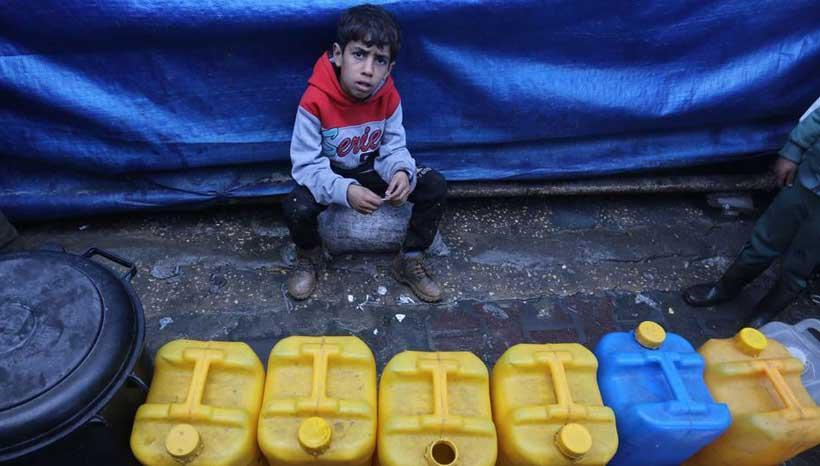By
I Gusti Ngurah Krisna Dana
Africa-Press – Mozambique. In August 2025, Gaza is not only running out of water but is also being deprived of it. The territory is under siege, battered by conflict, and cut off from essential supplies, and 2.3 million people are living far below the survival threshold for water access. This is more than a humanitarian crisis; it is also a geopolitical warning about the future of water security in an age of climate change and conflict.
The United Nations’ humanitarian standard, as set out in the Sphere Handbook, requires at least 15 litres of water per person per day for drinking, cooking, and hygiene (Sphere Association, 2018). Yet in Gaza, residents now survive on just 3–5 litres a day (OCHA, 2025), and the consequences are both immediate and predictable. Reuters (2025) reports a 150% rise in waterborne diseases over the last three months, and the World Health Organization (WHO, 2025) warns that thousands of children under five are suffering acute malnutrition because their immune systems are weakened by unsafe water and inadequate sanitation.
Even before the war escalated, Gaza’s water system was fragile because the coastal aquifer — the territory’s main natural water source — was already 97% unfit for human consumption (UNICEF, 2024). Decades of blockade also restricted access to pipes, pumps, and treatment chemicals, leaving infrastructure in chronic disrepair. Since late 2023, more than 70% of Gaza’s water and sanitation systems have been damaged or destroyed (UNICEF, 2025), so pipelines lie shattered, pumping stations are silent for lack of fuel, and desalination plants are forced to shut down whenever the power cuts.
International humanitarian law under the Geneva Conventions prohibits attacking “objects indispensable to the survival of the civilian population,” and this includes drinking water installations. Yet scholars such as Gleick (2014) have documented how water has been weaponised in modern conflicts, used to coerce, punish, or control populations. In Gaza, this weaponisation takes many forms: direct strikes on water and sanitation facilities, fuel restrictions that cripple water pumping and desalination, and blockades on repair materials so damage remains unrepaired. Political ecologists call this hydropolitical vulnerability (Zeitoun & Warner, 2006) because dependence on limited water resources makes a population strategically exposed.
It is tempting to see Gaza’s water crisis as purely a humanitarian emergency, but it is also a case study in how resource control shapes conflict. Water is inherently political because it flows across borders, sustains economies, and underpins sovereignty. In the Middle East, one of the world’s most water-stressed regions, scarcity has driven both conflict and cooperation, yet Gaza stands outside meaningful water-sharing agreements. Its isolation leaves it entirely reliant on self-contained systems, and those systems are now shattered. The Global Water Security 2023 Assessment (ODNI, 2023) warns that similar scenarios could emerge worldwide as climate change intensifies and competition for resources grows.
Gaza’s plight is part of a troubling global trend. In Syria, water plants were targeted in Aleppo; in Yemen, blockades restricted treatment supplies; in Sudan, armed groups used control over river crossings as leverage. Across the Sahel, wells have been seized as tools of territorial dominance. As scarcity increases, water’s political and military value will only grow. If the world fails to act decisively in Gaza, it will tell future belligerents that denying water is an acceptable tactic of war.
The UN General Assembly’s Resolution 64/292 (2010) recognises access to safe and clean drinking water as a human right, and denying that right in conflict is both a legal violation and an assault on human dignity. Bakker (2012) argues that water governance is inseparable from justice, and the denial of water is the denial of life itself. This act undermines not only humanitarian norms but also the chance for post-conflict recovery.
The immediate priorities are clear: fuel and power must be restored to Gaza’s desalination plants and pumping stations; engineers and repair crews must have safe access to fix pipelines and treatment plants; and humanitarian corridors must be opened specifically for water and sanitation supplies. But short-term relief alone will not break the cycle. Long-term stability will require investment in renewable-powered desalination so dependence on politically restricted fuel imports is reduced. It will also need international oversight to protect water systems and a commitment to making water access a non-negotiable part of any peace agreement.
Water is life, and in Gaza, life is being drained away slowly and deliberately. If the world remains silent, it will normalise one of the most dangerous tactics in modern warfare. Protecting Gaza’s water is not just a humanitarian act — it is a defence of the principle that even in war there are limits, and that the most essential resource for human survival must remain beyond the reach of politics and siege.
moderndiplomacy
For More News And Analysis About Mozambique Follow Africa-Press






